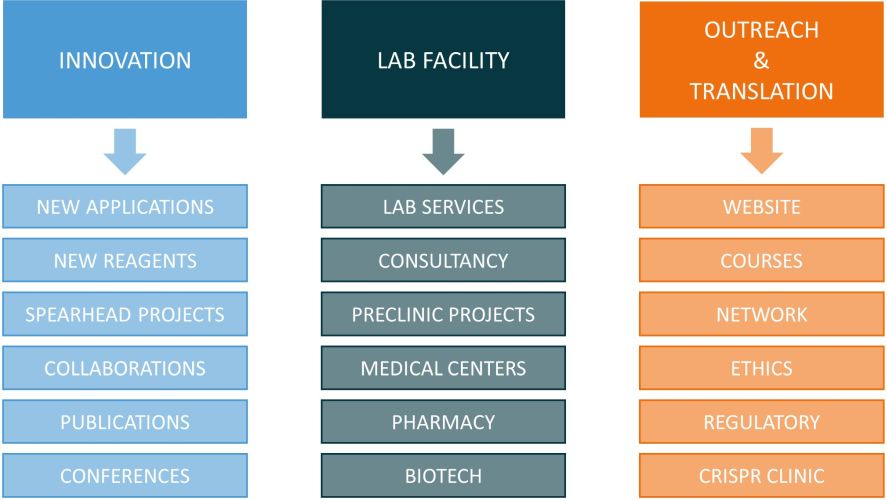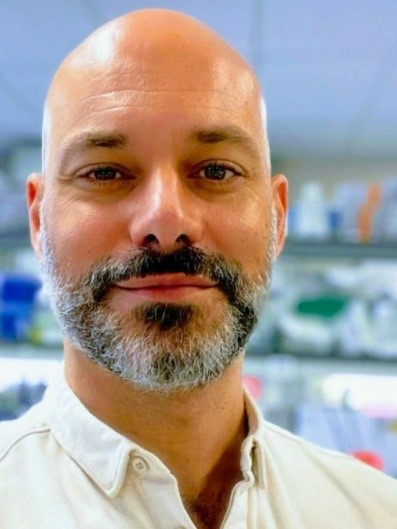In 2020, Emmanuelle Charpentier and Jennifer Doudna received the ultimate science prize - the Nobel Prize in Chemistry - for discovering CRISPR/Cas9 genetic scissors. This recognition underscored the vast potential of this revolutionary gene editing technology in various fields, particularly medicine. Since the adaptation of CRISPR from bacterial immune system into a workhorse for scientific discoveries, a vast tsunami of biomolecular assays and cancer research tools has been developed, offering exciting new opportunities to our researchers. Meanwhile, the first therapeutic CRISPR applications to counteract genetic diseases have been approved or recommended for approval by American and European regulatory authorities.
To expedite CRISPR applications and assist fundamental and (pre)clinical researchers in fully utilizing this unprecedented technology, a CRISPR platform governed by Rob Wolthuis, Louis Vermeulen, and Eric Eldering was established through a strategic investment by Cancer Center Amsterdam in 2017. Building upon this initiative, the Amsterdam UMC CRISPR platform was established in 2020 with additional funding from an Amsterdam UMC innovation grant. In response to increasing demands for basic and clinical CRISPR expertise, the Department of Human Genetics at Amsterdam UMC launched a 5-year investment plan in support of the Amsterdam UMC CRISPR Center in 2023.
Mission of the Amsterdam UMC CRISPR Center
The mission of the CRISPR Center is to make reagents and protocols accessible to CRISPR users, remain current by implementing novel CRISPR applications, and educate students, researchers and health professionals. To accommodate this mission, the CRISPR Center rests on 3 pillars: Innovation, Lab Facility, and Outreach & Translation.

Three pillars of the CRISPR Center: Innovation, Lab Facility, and Outreach & Translation
CRISPR Innovation
The CRISPR Center aspires to be at the forefront of CRISPR research, pushing the boundaries of knowledge and exploring new applications of gene editing across various fields. Besides conducting innovative research projects that achieve scientific advancements. These innovative projects will contribute to the enhancement and expansion of the Lab Facility's portfolio, providing an increased and up-to-date suite of services for CRISPR users.
CRISPR Lab Facility
The CRISPR Center lab facility offers a comprehensive range of services, from the latest reagents and cell models to hands-on laboratory assistance for CRISPR-based cell engineering and functional genetic screening. In addition, the Center curates an ever-expanding portfolio of up-to-date protocols for both researchers and commercial parties. The CRISPR Center lab will be located on the second floor of the RDC/Adore building in 2025.
CRISPR Outreach & Translation
The CRISPR Center is dedicated to providing educational and training programs tailored for scientists, researchers, and biomedical professionals who are keen to explore the potential of CRISPR technology. Our comprehensive offerings, including workshops, seminars, easily accessible online resources, and practical training sessions, are designed to equip participants with the essential knowledge and skills required to effectively and ethically apply CRISPR technology in their respective fields.
Furthermore, the Center actively engages in evaluating the evolving clinical applications of CRISPR-based technologies, particularly in the realms of gene therapy and genome diagnostics. This involvement extends to participating in critical discussions surrounding the ethical considerations and regulatory frameworks governing the use of CRISPR as a therapeutic modality.
Structure of the Amsterdam UMC CRISPR Center
The aim of the 5-year investment plan by the Department of Human Genetics is to elevate the Amsterdam UMC CRISPR Center to a Knowledge Center, integrating features of a Core Facility. This ambitious plan will position the CRISPR Center to
- Offer specialized consultancy for CRISPR-related inquiries.
- Conduct preclinical and clinical research utilizing CRISPR.
- Drive the implementation of cutting-edge CRISPR innovations.
- Provide a range of CRISPR laboratory services, including the development of cell models and (genome wide) functional genetic screening.
To establish a sustainable financial model, several of these provisions will be offered for a fee. Additional revenue will be generated by participation in grant applications.

Dr. Rodrigo Leite de Oliveira, CRISPR Center Manager
To enhance interactions and dissemination of knowledge, the CRISPR Center Manager Dr. Rodrigo Leite de Oliveira, Assistant Professor at the Dept. of Human Genetics, is stationed between the VUmc and AMC locations.
The CRISPR Center has identified several key R&D focus over the years that are particularly important to the Cancer Center Amsterdam community. These include the development of methods for effective gene inactivation, creation of specific point-mutations, in-locus gene (fluorescent) tagging techniques, (genome wide) in vitro screening, and improved delivery methods of CRISPR reagents to the target cells.
Resources of the Amsterdam UMC CRISPR Center
The CRISPR Center has succeeded in creating an accessible biobank of CRISPR reagents, such as plasmids, enzymes, and cell line models. In addition, CRISPR protocols containing validated molecular biology materials and testable controls have been developed, which have been highly rated by collaborating researchers.
The CRISPR Center has provided consultancy to nearly 100 projects, including 20 outside the CCA, and several outside of the Netherlands. It is a co-applicant on numerous grant applications (KWF, EU, ZonMW, and NWO). The Center has also recently boosted its capabilities by acquiring funds to purchase a digital droplet PCR platform.
Future
Embedded within the Department of Human Genetics and closely allied with Cancer Center Amsterdam, the Emma Center for Personalised Medicine, and the ADORE initiative, the CRISPR Center is actively seeking to broaden its scope. This expansion includes fostering collaborations with other research departments and research institutes at Amsterdam UMC, as well as engaging external parties. The Center has already received great interest from many researchers, particularly for its state-of-the-art whole genome screenings pipeline.
In addition, the CRISPR Center plans to expand its focus to the clinical application of gene editing technologies. This will include cell and gene therapy, and diagnostic applications. Given the revolutionary impact of CRISPR technologies worldwide, it comes as no surprise that the Amsterdam UMC CRISPR Center is already receiving many emails with clinical-related questions by doctors and patients.
For more information, contact Dr. Rodrigo Leite de Oliveira at the Amsterdam UMC CRISPR Center.
Text by Rodrigo Leite de Oliveira and New Haven Biosciences Consulting.
This article was created for Cancer Center Amsterdam.
Follow Cancer Center Amsterdam on LinkedIn & Twitter /X.
© 2024 New Haven Biosciences Consulting– All rights reserved.

